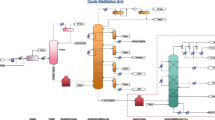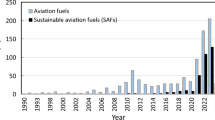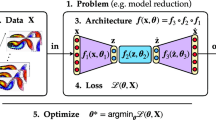Abstract
The exploration and production of oil and natural gas facing unprecedented demands for a secure energy supply worldwide is continuing a long trend to develop and adopt new technologies to help meet this challenge. For many oilfield technologies mathematical modeling and simulation have played a truly enabling role throughout their development and eventually their commercial adoption. Looking ahead, the vision of data-driven “intelligent” oilfields designed and operated using simulations to reach higher recovery factors is becoming a reality. Very little of this vision would be possible let alone make sense without the capability to move information across several simulation domains. We will examine several successes of modeling and simulation as well as current limitations which need to be addressed by new developments in theory, modeling, algorithms and computer hardware. Finally, we will mention several fundamental issues affecting oil recovery for which increased understanding is needed from new experimental methods coupled to simulation.
Similar content being viewed by others
References
Abubakar A., van den Berg P.M., Habashy T.M.: An integral equation approach for 2.5-dimensional forward and inverse electromagnetic scattering. Geophys. J. Int. 165, 744–762 (2006)
Akubakar, A., Habashy, T.M., Drushkin, V.L., Knizhnerman, L., Alumbaugh, D.: Two-and-half dimensional forward and inverse modelling for interpretation of low-frequency electromagnetic measurements. to be published in Geophysics (2008)
Altman, R., Ferris, P., Filardi, F.: Latest generation horizontal well placement technology helps maximize production in deep water turbidite reservoirs. In: SPE 108693. Veracruz (2007)
Auzerais F. et al.: Transport in sandstone: a study based on three dimensional microtomography. Geophys. Lett. 23, 705–708 (1996)
Bear J.: Dynamics of Fluids in Porous Media. Dover, Mineola (1972)
Blair S.A., Berge P.A., Berryman J.G.: Using two point correlation functions to characterize microgeometry and estimate permeabilities of sandstones and porous glass. J. Gepphys. Res. 101, 20359–20375 (1996)
Blunt M.J.: Flow in porous media-pore-network models and multiphase flow. Curr. Opin. Colloid Interface Sci. 6, 197–207 (2001)
Boutte, D.: Seismic-to-simulation arrives. Hart’s E&P J (July 2007)
Branco V., Mansoori G.A., Xavier L., Park S.J., Manafi H.: Asphaltene flocculation and collapse from petroleum fluids. J. Petrol. Sci. Eng. 32, 217–230 (2001)
Burstedde, C., Ghattas, O.: Algorithmic strategies for full waveform inversion: 1D experiments. In: Society of Exploration Geophysicists, San Antonio, 1913–1917 (2007)
Chen Z., Appenzeller J., Knoch J., Lin Y.-M., Avouris P.: The role of metal-nanotube contact in the performance of carbon nanotube field-effect transistors. Nano Lett. 5, 1497–1502 (2005)
Colombo D., De Stefano M.: Geophysical modeling via simultaneous joint inversion of seismic, gravity, and electromagnetic data: application to prestack depth imaging. Leading Edge 26, 326–331 (2007)
Datta S.: Quantum Transport: Atom to Transister. Cambridge University Press, Cambridge (2005)
Eidesmo T. et al.: Sea bed logging. A new method for remote and direct identification of hydrocarbon-filled layers in deepwater areas. First Break 20, 144–152 (2002)
Ellis, D.V., Singer, J.M.: Well Logging for Earth Scientists. Springer Verlag (2007)
Frankland, S.J.V., Harik, V.M.: Simulation of carbon nanotube pull-out when bonded to a polymer matrix. In: Materials Research Society Proceedings, vol. 740, paper I12.1, 1-6 (2003)
Friedrich J.T., DiGiovanni A.A., Noble D.R.: Predicting macroscopic transport properties using microscopic image data. J. Geophys. Res. 111, 1–14 (2006)
Glotzer S., Paul W.: Molecular and mesoscale simulation methods for polymer materials. Annu. Rev. Mater. Res. 32, 401–436 (2002)
Griebel M., Hamaekers J.: Molecular dynamics simulations of the elastic moduli of polymer carbon nanotube composites. Comput. Methods Appl. Mech. Eng. 193, 1773–1788 (2004)
Habashy T.M., Abuakar A.: A general framework for constraint minimization for inversion of electromagnetic measurements. Progr. Electromagn. Res. 46, 265–312 (2004)
Kang Q., Lichtner P.C., Zhang D.: Lattice-Boltzmann pore-scale model for multicomponent reactive transport in porous media. J. Geophys. Res. 111, B05203 (2006)
Keehm Y., Nur A.: Permeability from thin sections: 3D reconstruction and lattice-Boltzmann simulation. Geophys. Res. Lett. 31, 1–4 (2004)
Khairul A., Lake R.K.: Leakage and performance of zero-Schottky-barrier carbon nanotube transistors. J. Appl. Phys. 98, 064307 (2005)
Kleinberg R., Clark B.: Physics in oil exploration. Phys. Today 48, 48–53 (2002)
Lake R., Klimeck G., Bowen R.C., Jovanovic D.: Single and multiband modeling of quantum electron transport through layered semiconductor devices. J. Appl. Phys. 81, 7845–7869 (1997)
Lasaga A.C., Luttge A.: Variation of crystal dissolution rate based on a dissolution stepwave model. Science 291, 2400–2404 (2001)
Li, Q., et al.: New directional electromagnetic tool for proactive geosteering and accurate formation evaluation while drilling. In: SPWLA 46th Annual Logging Symposium. New Orleans (2005)
Liu Y.J.: Large scale modeling of carbon nanotube composites by a fast multipole boundary element method. Comput. Mater. Sci. 34, 173–187 (2005)
Luthi, S.M.: Geological Well Logs: Their Uses in Reservoir Modeling. Springer Verlag (2001)
Luttge A., Winkler U., Lasaga A.C.: Interferometric study of the dolomite dissolution: a new conceptual model for mineral dissolution. Geochim. Cosmochim. Acta 67, 1099–1116 (2003)
Martys N., Chen H.: Simulations of multicomponent fluids in complex three dimensional geometries by the lattice Boltzmann method. Phys. Rev. E 53, 743–750 (1996)
Mendoza, A., Preeg, W., Torres-Verdin, C., Alpak, C.: Monte Carlo modeling of nuclear measurements in vertical and horizontal wells in the presence of mud-filtrate invasion and salt mixing. In: Society of Petrophysicists and Well Log Analysts 46th Annual Logging Symposium, New Orleans (2005)
Mullins O., Sheu E.Y., Hammami A., Marshall A.G. (eds.): Asphaltenes, Heavy oils, and Petroleomics. Springer Science, New York (2007)
Odegard G.M., Gates T.S., Wise K.E., Park C., Siochi E.J.: Constitutive modeling of carbon nanotube re-inforced polymer composites. Compos. Sci. Technol. 63, 1671–1687 (2003)
Oden, J.T., et al.: Revolutionizing engineering science through simulation. Report of the National Science Foundation Blue Ribbon Panel on Simulation-Based Engineering Science, National Science Foundation (2006)
Osdal B. et al.: Mapping the fluid front and pressure buildup using 4D data on Norne field. Leading Edge 9, 1134–1141 (2006)
Pickering, S.: Q-reservoir: advanced seismic technology for reservoir solutions. Oil Gas North Africa Mag. Jan–Feb 2003, 26–30 (2003)
Pratt R.G., Shin C., Hicks G.J.: Gauss–Newton and full Newton methods in frequency-space seismic waveform inversion. Geophys. J. Int. 133, 341–362 (1998)
Rothman, D.H., Zaleskki, S.: Lattice-Gas Cellular Automata. Cambridge University Press (1997)
Ryu, S.: Personnal Communication (2008)
Sham T.K., Rivers M.L.: A brief overview of synchrontron radiation in low temperature geochemistry and environmental science. Rev. Mineral. Geochem. 49, 117–147 (2002)
Sinha M.C., MacGregor L.M.: Use of marine controlled-source electromagnetic sounding for sub-basalt exploration. Geophys. Prospecting 48, 1091–1106 (2000)
Sirgue L., Pratt R.G.: Efficient waveform inversion and imaging: a strategy for selecting temporal frequencies. Geophysics 69, 231–248 (2004)
Steefel C.I., MacQuarrie K.T.B.: Approaches to modeling reactive transport in porous media. Rev. Minerol. 34, 83–125 (1996)
Tarantola A.: Inverse Problem Theory. Elsevier Science B.V., Amsterdam (1987)
Top500. http://www.top500.org/.
Tweedie C.A., Anderson D.G., Langer R., Van Vliet K.J.: Combinatorial materials mechanics: high-throughput polymer synthesis and nanomechanical screening. Adv. Mater. 17, 2599–2604 (2005)
Valvatne P.H., Blunt M.J.: Predictive pore scale modeling of two phase flow in mixed wet media. Water Resour. Res. 40, 1–21 (2004)
Vander Veen J.F., Reichert H.: Structural ordering at the solid–liquid interface. Mater. Res. Soc. Bull. 29, 958–962 (2004)
Venugopal R., Ren Z., Datta S., Lundstrom M.S., Jovanovic D.: Simulating quantum transport in nanoscale MOSFETs: real vs mode space approaches. J. Appl. Phys. 92, 3730–3739 (2002)
Voter A.F., Montalenti F., Germann T.C.: Extending the time scale in atomistic simulation of materials. Annu. Rev. Mater. Res. 32, 321–346 (2002)
Wong E.W., Sheehan P.E., Lieber C.: Nanobeam mechanics: elasticity, strength and toughness of nanorods and nanotubes. Science 277, 1971–1975 (1997)
Author information
Authors and Affiliations
Corresponding author
Rights and permissions
About this article
Cite this article
Ullo, J. Computational challenges in the search for and production of hydrocarbons. Sci Model Simul 15, 313–337 (2008). https://doi.org/10.1007/s10820-008-9095-z
Received:
Accepted:
Published:
Issue Date:
DOI: https://doi.org/10.1007/s10820-008-9095-z




